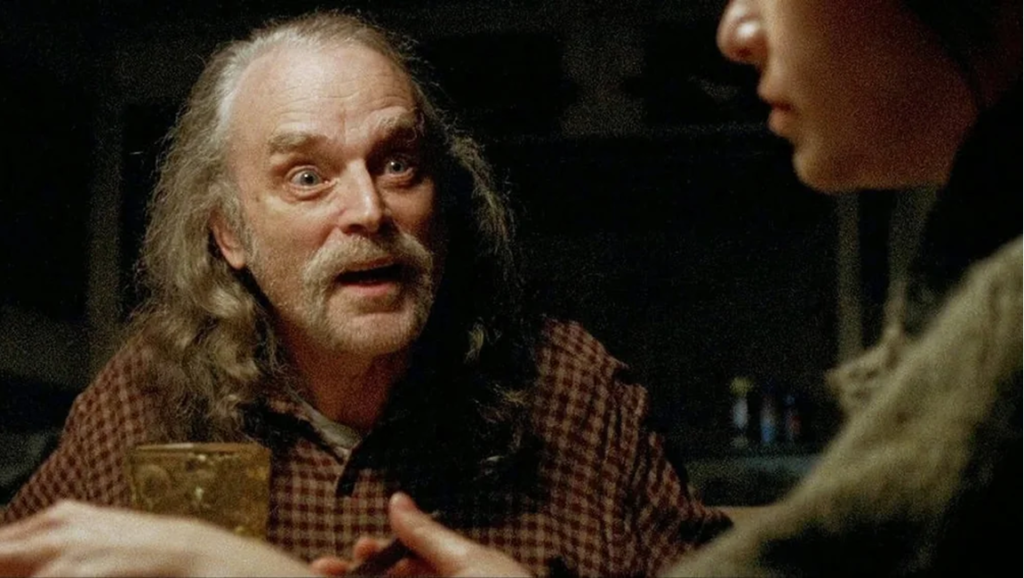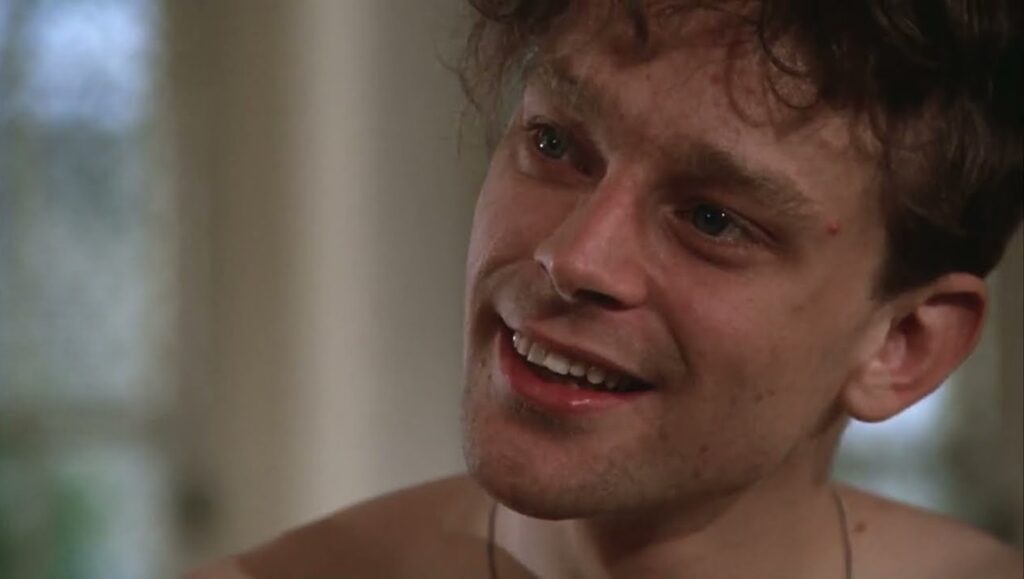Brad Dourif, known for his madman characters and many cinematic iniquities, is, it’s easy to forget, capable of staggering eclecticism. His career, unimpeachable, daring, perfectly weird, is based on an non-judgmental approach. He’s taken the shape of men both strange and normal, believable and absurd, painfully human and grotesque, resulting in a diverse array of eccentric and down-to-earth performances that are histrionic and subtle, heroes and villains, lucid and lunatic, scary and scared. He is that rare thing: an actor with a unique, inimitable presence which remains as perdurable as a flickering, coruscating soul, no matter what kind of character in what kind of film, from Oscar-winners to abject garbage. Dourif is always distinctly Dourif while never repeating the same technique or recycling details. He inculcates each character — whether in a cameo (e.g. a kindly, stuttering gas station attendant in Urban Legend, unfairly labeled a killer) or as the lead via voice-only performances (the Chucky franchise) or a moral man in an amoral era (Deadwood) — with their own energy, their own life; he creates for each their own identity that sublimates the films, if only for one scene.
Since his Oscar-nominated performance as a gangly, troubled young man trapped with his fellow nutjobs in the smothering white ubiquity of lifeless rooms and halls of a psychiatric asylum in One Flew Over the Cuckoo’s Nest, Dourif has split the median between character actor and leading man. He buzzes with tremulous energy, but he controls it with consummate skill, knows when to internalize and when to explode, using his innate sensitivity for finding the right vibe for each role, adjusting volume and intensity, getting simpatico with the rhythm, whether he’s killing people from beyond the grave (The Exorcist III) or performing experiments on a clone of Sigourney Weaver (Alien: Resurrection) or exchanging scary stories with James Earl Jones over a campfire in the desolate west (Grim Prairie Tales) or torturing his teenage daughter with dad jokes to provide a brief reprieve from the pitiless, truly cruel violence committed by a mute man in a mask (Rob Zombie’s sublime Halloween II). It takes a good actor to make you sit through Critters 4, and a really good actor to match the ribald delirium of The Hazing, a film of hypnotic incompetence that would reject any performance of nuance. Unlike other over-actors, he doesn’t hijack movies or get lazy-loud; he understands what the film — not he — needs. And if the film needs a jolt of life, well, he’s got the defibrillator.
While he is exceptional in respectable dramas like Wise Blood and Ragtime, Dourif is likely associated most deeply and passionately with horror, particularly his eternal voice of the killer doll and cultural phenomenon Chucky, beginning with Child’s Play (a very scary movie) up through the character’s transmutation into a postmodern comedian in Bride of Chucky and Seed of Chucky to Don Mancini’s (Chucky’s creator) Cult of Chucky (a very fun, gory, cleverly silly work of love) and even the series Chucky, which makes a relic of the Reagan era into a profoundly modern and political symbol. Dourif’s deranged chortle rings like a powerfully-clanged bell howling its chimes across a dark town, sleepy denizens unaware of the knee-high murderer lurking in the bedrooms of babes. But beyond that franchise, consider Dourif’s brief and lingering appearances in a variety of films of different styles, different aesthetics, different tones: in each film, a different performance. (Character actors don’t often get such diversity throughout their career.) There’s Blue Velvet, where he’s just hanging out with his coterie of creeps, looking weird in a way you can’t quite articulate, with his very ’80s mismatched formal wear and short skinny tie all debased by the eeriness of the scene. He’s in Mississippi Burning, in which he is better than the film, but not incongruous with its tone, and then there’s his oleaginous role as the treacherous Wormtongue in The Lord of the Rings.

But let’s instead focus for a moment on one single year, 1990, to explore three performances Dourif gave that together encapsulate everything the actor can do, in great films and crap, sad and sadistic, plain Joe and just plain nutty. First, there’s his small but vital role as an oddball exterminator facing off with mutant rat-monsters in Graveyard Shift, a terrible movie (adapted from Stephen King’s icky early story, featuring one of his better endings that doesn’t translate well to a visual medium) about the perpetually abused workers in a squalid, ramshackle textile mill; tasked with cleaning out the deep, dark bowels of the building, they encounter the most nightmarish vermin imaginable. The film provides a panoply of bizarre turns — Stephen Macht obliterates all measures of artistic merit with an insane accent and body gestures, very loud acting that, while undeniably fun in its hysteria, is, next to Dourif’s also absurd but fully-formed, carefully-calibrated performance, a bit too silly, a bit too forced. Dourif’s ridiculous line readings are all considered, far more than this movie demands; he makes decisions. When we first meet the exterminator, he’s crawling out of a filthy window with his cheek bulging with tobacco; he spits out a stream of murky juice before he says a word. Just the look in his eyes, half crazed, and convicted, makes you believe that he really is a rural-raised, poison-slinging looney tune.
In Tobe Hooper’s spectacular Spontaneous Combustion, Dourif gets to play the lead, a tragic victim of Cold War-era American jingoism and military hegemony who can set things (and people) on fire. A film of vibrant variegation and compositions conjured from the nightmares of a lower-budget noir, it’s sad, suspenseful, beautiful, and would not work without Dourif’s prowess at making important adjustments as the film goes on, as situations change and change his character. It’s Dourif’s finest work as a protagonist. Also in 1990, he gave his most gloriously histrionic performance as a villain (a performance no one else could have done with such conviction and care), a long-dead killer somehow still continuing his devil’s work in The Exorcist III, a film that, while corrupted by producers (making it something like the Magnificent Ambersons of horror), remains an unlikely masterpiece, even more impressive given the major interference that hobbled writer/director William Peter Blatty. Though Blatty won an Oscar adapting his own novel for the first film, he was kept on a short leash this time around. Here adapting his novel Legion, he displays uncanny instincts with just his second directorial effort. The film’s procedural mystery concerns a cantankerous detective (George C. Scott, inflammatory with quivering ennui) who thinks a serial killer dead for years called The Gemini has evaded the natural inevitability of death and is back to his old tricks, now entombed; he soon surmises, in the body of a laconic, living-dead Damian, housed deep in the forlorn corner of a hospital wing for dangerous patients. What the hell is going on? It’s a deft marriage of murder mystery and supernatural horror, replete with images of the quotidian rendered demonic and paced with careful deliberation — at least until the ending that was, to Blatty’s chagrin, reshot to include an effects-flaunting spectacular exorcism for the climax. Dourif plays The Gemini, who has taken control of the body of Damian, the priest who sacrificed himself at the end of Friedkin’s film. With ravishing scene-chewing theatrics, Dourif frightens, amuses, beguiles. He is truly deranged yet in control, his voice tainted by something impossibly wicked, his howls echoing in the ether of evil, a glint of that wickedness in his icy eyes — one of an actor’s greatest gifts, Dourif’s have never pierced so deeply.
A year after this trio of 1990 performances, viewers were able to see the depth and range of Dourif in Body Parts, in which he plays a supporting role of a failed painter who, following an accident that tore his arm off, is given a new one, sutured magically on, which suddenly, inexplicably makes him a great artist and his pieces start selling for big bucks. The problem is, the arm belonged to a psycho, and it still does. Here, Dourif is a regular unremarkable man, a loser, even, but finds evil simmering within. He is reluctant to part with the uncanny, necromantic appendage that has given him the success and self-worth that has been eluding him all his life. Ultimately, he does part with the arm — and his life. Another tragedy, another piteous man, another impossible evil.
Beyond these instructive glimpses, however, just consider the dizzying diversity of his other lesser or undervalued films and minor roles: matching Tommy Lee Jones’ presence in The Eyes of Laura Mars; Heaven’s Gate (with its now-legendary belated revival); with Lynch in the great Dune; in the wonderful Spike Lee joint Jungle Fever; much too good as the lead for the dreadful Death Machine; gracing us with a much-needed pop-in with the bad American remake of Nightwatch; credited as “Thin Bookish Guy” in the bad American remake of Pulse; and unironically excellent as an intelligent, by all evidence decent man but stricken with OCD, who is in — and often the target of cruel jokes by — a therapy group comprising a ragtag of people with various afflictions in Color of Night. Dourif is not an actor who thinks of himself as being better than a movie, nor one who taunts himself into a competition with the other actors and actresses, now one who phones it in for a payday. In all of these films, Dourif works in a mode which is a kind of coalescence of reliable character actor weirdness, something more classical, and the epic mugging of the method, a new style of his own design, itself now classic; as Chucky opines in Bride of Chucky, “A true classic never goes out of style.”
Anthology Film Archives is currently exhibiting a Brad Dourif retrospective, running from October 10-23.


Comments are closed.